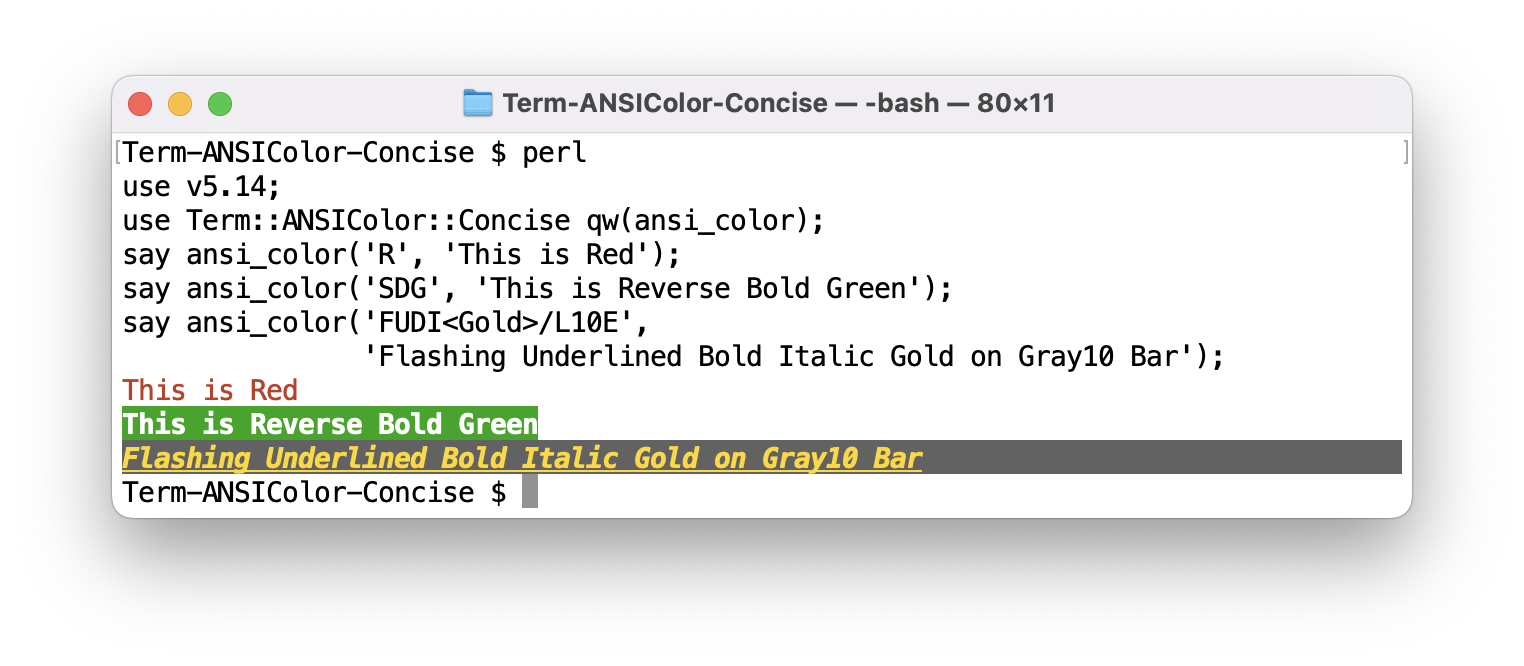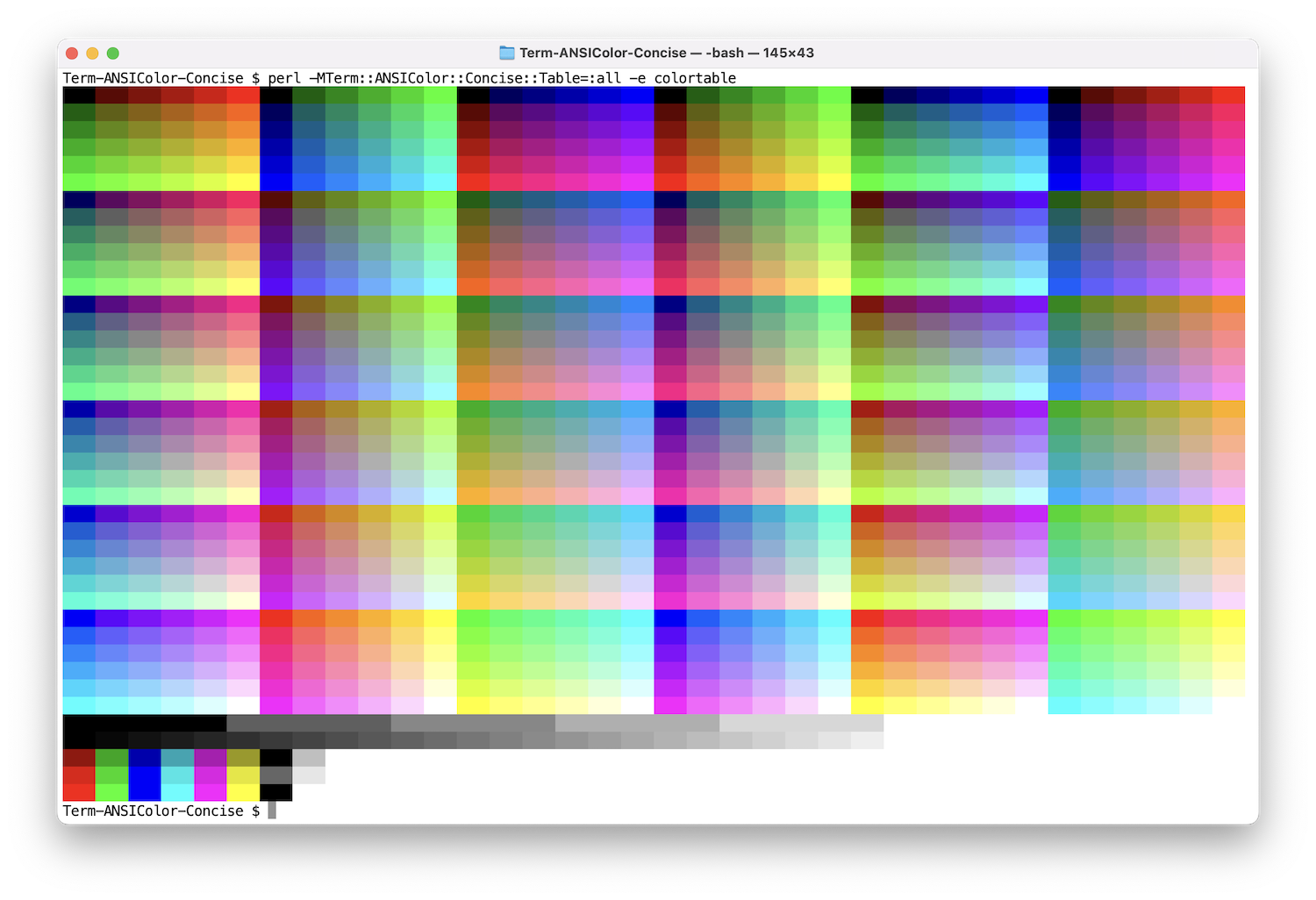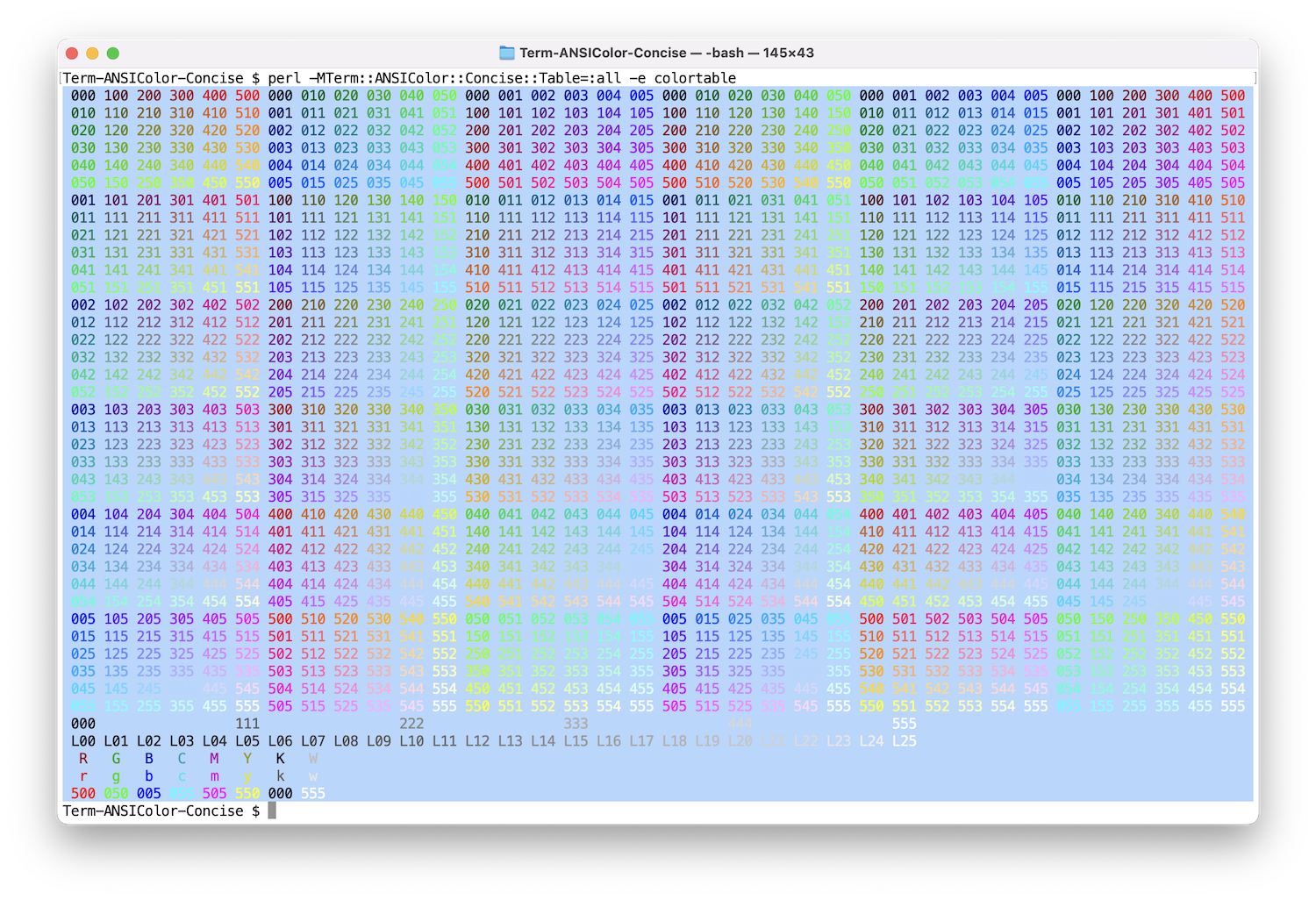NAME
Term::ANSIColor::Concise - Produce ANSI terminal sequence by concise notation
SYNOPSIS
use v5.14;
use Term::ANSIColor::Concise qw(ansi_color);
say ansi_color('R', 'This is Red');
say ansi_color('SDG', 'This is Reverse Bold Green');
say ansi_color('FUDI<Gold>/L10E',
'Flashing Underlined Bold Italic Gold on Gray10 Bar');
VERSION
Version 2.04
DESCRIPTION
This module provides a simple concise format to describe complicated colors and effects for ANSI terminals. These notations are supposed to be used in command line option parameters.
This module used to be a part of Getopt::EX::Colormap module, which provide easy handling interface for command line options.
256 or 24bit COLORS
By default, this library produces ANSI 256 color sequence. That is eight standard colors, eight high intensity colors, 6x6x6 216 colors, and gray scales in 24 steps.
Color described by 12bit/24bit RGB values are converted to 6x6x6 216 colors, or 24 gray scales if all RGB values are same.
For a terminal which can display 24bit colors, full-color sequence can be produced. See "ENVIRONMENT" section.
FUNCTION
- ansi_color(spec, text)
-
Return colorized version of given text. Produces 256 or 24bit colors depending on the setting.
In the result, given text is enclosed by appropriate open/close sequences. Close sequence can vary according to the open sequence. See "RESET SEQUENCE" section.
If the text already includes colored regions, they remain untouched and only non-colored parts are colored.
Actually, spec and text pair can be repeated as many as possible. It is same as calling the function multiple times with single pair and join results.
- ansi_color([ spec1, spec2, ... ], text)
-
If spec parameter is ARRAYREF, multiple specs can be specified at once. This is not useful for color spec because they can be simply joined, but may be useful when mixed with "FUNCTION SPEC".
- ansi_color_24(spec, text)
- ansi_color_24([ spec1, spec2, ... ], text)
-
Function ansi_color_24 always produces 24bit color sequence for 12bit/24bit color spec.
- cached_ansi_color(cache, spec, text)
-
Backend interface for ansi_color. First parameter is a hash object used to cache data. If you concern about cache mismatch situation, use this interface with original cache.
- ansi_pair(color_spec)
-
Produces introducer and recover sequences for given spec.
Additional third value indicates if the introducer includes Erase Line sequence. It gives a hint the sequence is necessary for empty string. See "RESET SEQUENCE".
- ansi_code(color_spec)
-
Produces introducer sequence for given spec. Reset code can be taken by ansi_code("Z").
- csi_code(name, params)
-
Produce CSI (Control Sequence Introducer) sequence by name with numeric parameters. Parameter name is one of standard (ICH, CUU, CUD, CUF, CUB, CNL, CPL, CHA, CUP, ED, EL, IL, DL, DCH, SU, SD, ECH, VPA, VPR, HVP, SGR, DSR, SCP, RCP) or non-standard (CSI, OSC, RIS, DECSC, DECRC, DECEC, DECDC).
COLOR SPEC
At first the color is considered as foreground, and slash (/) switches foreground and background. You can declare any number of components in arbitrary order, and sequences will be produced in the order of their presence. So if they conflicts, the later one overrides the earlier.
Color specification is a combination of following components:
BASIC 8+8
Single uppercase character representing 8 colors, and alternative (usually brighter) colors in lowercase :
R r Red
G g Green
B b Blue
C c Cyan
M m Magenta
Y y Yellow
K k Black
W w WhiteEFFECTS and CONTROLS
Single case-insensitive character for special effects :
N None
Z 0 Zero (reset)
D 1 Double strike (boldface)
P 2 Pale (dark)
I 3 Italic
U 4 Underline
F 5 Flash (blink: slow)
Q 6 Quick (blink: rapid)
S 7 Stand out (reverse video)
H 8 Hide (conceal)
X 9 Cross out
E Erase Line (fill by background color)
; No effect
/ Toggle foreground/background
^ Reset to foreground
~ Cancel following effectTilde (~) negates following effect; ~S reset the effect of S. There is a discussion about negation of D (Track Wikipedia link in SEE ALSO), and Apple_Terminal (v2.10 433) does not reset at least.
Single E is an abbreviation for {EL} (Erase Line). This is different from other attributes, but have an effect of painting the rest of line by background color.
6x6x6 216 COLORS
Combination of 0..5 for 216 RGB values :
Deep Light
<----------------->
000 111 222 333 444 : Black
500 511 522 533 544 : Red
050 151 252 353 454 : Green
005 115 225 335 445 : Blue
055 155 255 355 455 : Cyan
505 515 525 535 545 : Magenta
550 551 552 553 554 : Yellow
555 444 333 222 111 : White24 GRAY SCALES + 2
24 gray scales are described by L01 (dark) to L24 (bright). Black and White can be described as L00 and L25, those are aliases for 000 and 555.
L00 : Level 0 (Black)
L01 : Level 1
:
L24 : Level 24
L25 : Level 25 (White)RGB
12bit/24bit RGB :
(255,255,255) : 24bit decimal RGB colors
#000000 .. #FFFFFF : 24bit hex RGB colors
#000 .. #FFF : 12bit hex RGB 4096 colorsBeginning # can be omitted in 24bit hex RGB notation. So 6 consecutive digits means 24bit color, and 3 digits means 6x6x6 color, if they do not begin with #.
COLOR NAMES
Color names enclosed by angle bracket :
<red> <blue> <green> <cyan> <magenta> <yellow>
<aliceblue> <honeydew> <hotpink> <moccasin>
<medium_aqua_marine>These colors are defined in 24bit RGB. Names are case insensitive and underscore (_) is ignored, but space and punctuation are not allowed. So <aliceblue>, <AliceBlue>, <ALICE_BLUE> are all valid but <Alice Blue> is not. See "COLOR NAMES" section for detail.
CSI SEQUENCES and OTHERS
Native CSI (Control Sequence Introducer) sequences in the form of {NAME}.
ICH n Insert Character
CUU n Cursor up
CUD n Cursor Down
CUF n Cursor Forward
CUB n Cursor Back
CNL n Cursor Next Line
CPL n Cursor Previous line
CHA n Cursor Horizontal Absolute
CUP n,m Cursor Position
ED n Erase in Display (0 after, 1 before, 2 entire, 3 w/buffer)
EL n Erase in Line (0 after, 1 before, 2 entire)
IL n Insert Line
DL n Delete Line
DCH n Delete Character (scroll rest to left)
SU n Scroll Up
SD n Scroll Down
ECH n Erase Character
VPA n Vertical Position Absolute
VPR n Vertical Position Relative
HVP n,m Horizontal Vertical Position
SGR n* Select Graphic Rendition
DSR n Device Status Report (0 cursor position)
SCP Save Cursor Position
RCP Restore Cursor PositionThese names can be followed by optional numerical parameters, using comma (,) or semicolon (;) to separate multiple ones, with optional parentheses. For example, color spec DK/544 can be described as {SGR1;30;48;5;224} or more readable {SGR(1,30,48,5,224)}.
Some other escape sequences are supported in the form of {NAME}. These sequences do not start with CSI, and do not take parameters. VT100 compatible terminal usually support these, and does not support SCP and RCP CSI code.
CSI Control Sequence Introducer
OSC Operating System Command
RIS Reset to Initial State
DECSC DEC Save Cursor
DECRC DEC Restore Cursor
DECEC DEC Enable Cursor
DECDC DEC Disable CursorEXAMPLES
8+8 6x6x6 12bit 24bit names
=== ======= ========= ============= ==================
B 005 #00F (0,0,255) <blue>
/M /505 /#F0F /(255,0,255) /<magenta>
K/W 000/555 #000/#FFF #000000/#FFFFFF <black>/<white>
R/G 500/050 #F00/#0F0 #FF0000/#00FF00 <red>/<green>
W/w L03/L20 #333/#ccc #333333/#cccccc <gray20>/<gray80>COLOR NAMES
Color names listed in Graphics::ColorNames::X module can be used. See https://en.wikipedia.org/wiki/X11_color_names.
aliceblue antiquewhite aqua aquamarine azure beige bisque black
blanchedalmond blue blueviolet brown burlywood cadetblue
chartreuse chocolate coral cornflowerblue cornsilk crimson cyan
darkolivegreen dimgray dimgrey dodgerblue firebrick floralwhite
forestgreen fuchsia gainsboro ghostwhite gold goldenrod gray green
greenyellow grey honeydew hotpink indianred indigo ivory khaki
lavender lavenderblush lawngreen lemonchiffon lightgoldenrodyellow
lime limegreen linen magenta maroon midnightblue mintcream
mistyrose moccasin navajowhite navy navyblue oldlace olive
olivedrab orange orangered orchid papayawhip peachpuff peru pink
plum powderblue purple rebeccapurple red rosybrown royalblue
saddlebrown salmon sandybrown seagreen seashell sienna silver
skyblue slateblue slategray slategrey snow springgreen steelblue
tan teal thistle tomato turquoise violet violetred webgray
webgreen webgrey webmaroon webpurple wheat white whitesmoke
x11gray x11green x11grey x11maroon x11purple yellow yellowgreenIn the above list, next colors have variants with prefix of dark, light, medium, pale, deep.
aquamarine medium_aquamarine
blue dark_blue light_blue medium_blue
coral light_coral
cyan dark_cyan light_cyan
goldenrod dark_goldenrod light_goldenrod pale_goldenrod
gray dark_gray light_gray
green dark_green light_green pale_green
grey dark_grey light_grey
khaki dark_khaki
magenta dark_magenta
orange dark_orange
orchid dark_orchid medium_orchid
pink deep_pink light_pink
purple medium_purple
red dark_red
salmon dark_salmon light_salmon
seagreen dark_seagreen light_seagreen medium_seagreen
skyblue deep_skyblue light_skyblue
slateblue dark_slateblue light_slateblue medium_slateblue
slategray dark_slategray light_slategray
slategrey dark_slategrey light_slategrey
springgreen medium_springgreen
steelblue light_steelblue
turquoise dark_turquoise medium_turquoise pale_turquoise
violet dark_violet
violetred medium_violetred pale_violetred
yellow light_yellowNext colors have four variants. For example, color brown has brown1, brown2, brown3, brown4.
antiquewhite aquamarine azure bisque blue brown burlywood
cadetblue chartreuse chocolate coral cornsilk cyan darkgoldenrod
darkolivegreen darkorange darkorchid darkseagreen darkslategray
deeppink deepskyblue dodgerblue firebrick gold goldenrod green
honeydew hotpink indianred ivory khaki lavenderblush lemonchiffon
lightblue lightcyan lightgoldenrod lightpink lightsalmon
lightskyblue lightsteelblue lightyellow magenta maroon
mediumorchid mediumpurple mistyrose navajowhite olivedrab orange
orangered orchid palegreen paleturquoise palevioletred peachpuff
pink plum purple red rosybrown royalblue salmon seagreen seashell
sienna skyblue slateblue slategray snow springgreen steelblue tan
thistle tomato turquoise violetred wheat yellowgray and grey have 100 steps of variants.
gray gray0 .. gray100
grey grey0 .. grey100See https://en.wikipedia.org/wiki/X11_color_names#Color_variations for detail.
FUNCTION SPEC
Color spec can be CODEREF or object. If it is a CODEREF, that code is called with text as an argument, and return the result.
If it is an object which has method call, it is called with the variable $_ set as target text.
RESET SEQUENCE
This module produces RESET and Erase Line sequence to recover from colored text. This is preferable to clear background color set by scrolling in the middle of colored text at the bottom of the terminal.
However, on some terminal, including Apple_Terminal, Erase Line sequence clear the text on the cursor position when it is at the rightmost column of the screen. In other words, rightmost character sometimes mysteriously disappear when it is the last character in the colored region. If you do not like this behavior, set module variable $NO_RESET_EL or ANSICOLOR_NO_RESET_EL environment.
Erase Line sequence {EL} clears the line from cursor position to the end of the line, which means filling the area by background color. When Erase Line is explicitly found in the start sequence, it is copied to just before (not after) ending reset sequence, with preceding sequence if necessary, to keep the effect of filling line even if the text is wrapped to multiple lines.
See "ENVIRONMENT" section.
LESS
Because Erase Line sequence end with K, it is a good idea to tell less command so, if you want to see the output using it.
LESS=-cR
LESSANSIENDCHARS=mKENVIRONMENT
If the environment variable NO_COLOR is set, regardless of its value, colorization interface in this module never produce color sequence. Primitive function such as ansi_code is not the case. See https://no-color.org/.
Function ansi_color produces 256 or 24bit colors depending on the value of $RGB24 module variable. Also 24bit mode is enabled when environment ANSICOLOR_RGB24 is set or COLORTERM is truecolor.
If the module variable $NO_RESET_EL set, or ANSICOLOR_NO_RESET_EL environment, Erase Line sequence is not produced with RESET code. See "RESET SEQUENCE".
COLOR TABLE
Color table can be shown by other module Term::ANSIColor::Concise::Table. Next command will show table of 256 colors.
$ perl -MTerm::ANSIColor::Concise::Table=:all -e colortable

SEE ALSO
Getopt::EX::Colormap
This module is originally implemented in Getopt::EX::Colormap module. It provides an easy way to maintain labeled and indexed list for color handling in command line option.
You can take care of user option like this:
use Getopt::Long;
my @opt_colormap;
GetOptions('colormap|cm:s' => @opt_colormap);
require Getopt::EX::Colormap;
my %label = ( FILE => 'DR', LINE => 'Y', TEXT => '' );
my @index = qw( /544 /545 /445 /455 /545 /554 );
my $cm = Getopt::EX::Colormap
->new(HASH => \%label, LIST => \@index)
->load_params(@opt_colormap); And then program can use it in two ways:
print $cm->color('FILE', $filename);
print $cm->index_color($index, $pattern);This interface provides a simple uniform way to handle coloring options for various tools.
App::ansiecho
To use this module's function directly from a command line, App::ansiecho is a good one. You can apply colors and effects for echoing argument.
App::Greple
This code and Getopt::EX was implemented as a part of App::Greple command originally. It is still a intensive user of this module capability and would be a good use-case.
OTHERS
https://en.wikipedia.org/wiki/ANSI_escape_code
https://en.wikipedia.org/wiki/X11_color_names
https://www.ecma-international.org/wp-content/uploads/ECMA-48_5th_edition_june_1991.pdf
AUTHOR
Kazumasa Utashiro
COPYRIGHT
The following copyright notice applies to all the files provided in this distribution, including binary files, unless explicitly noted otherwise.
Copyright 2015-2023 Kazumasa Utashiro
LICENSE
This library is free software; you can redistribute it and/or modify it under the same terms as Perl itself.